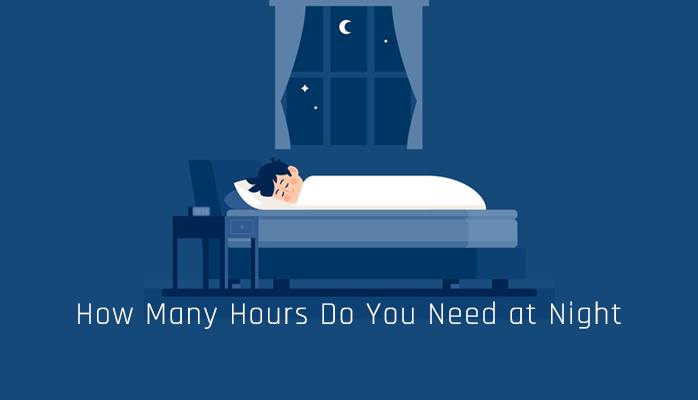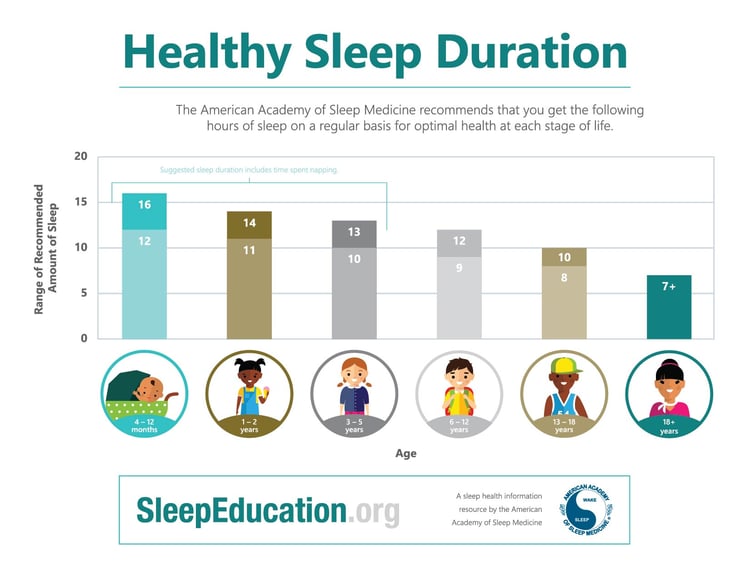Relationship Between and Age
Age is likely the most important factor in how much sleep one needs. Additionally, sleep patterns and circadian rhythms change with age. Most individuals will not have similar sleep patterns at 10, 20 and 50 years of age.
Why does this matter? Sleep deprivation is not always caused by lack of sleep at night. Even if someone cannot sleep enough at night, they can certainly nap during the day to get the recommended 7-9 total hours of sleep. Changes in sleep pattern may affect both the ability to sleep at night and during the day.
Additional influences of sleep are personal factors. Each individual has unique work and life circumstances that dramatically affect when, where, and how one sleeps. Such life factors also need to be taken into account when evaluating whether or not one sleeps enough.
Let’s look at how much sleep you need based on age.
How Much Sleep Do Babies Need?
Babies need the most amount of sleep, both through the night and during the day. The following guidelines layout how much sleep babies need [Sleep Foundation]:
- Age 0-4 months
- 11-19 hours; recommended 14-17 hours
- Age 4-12 months
- 10-18 hours; recommended 12-16 hours
Babies can develop sleeping disorders (it’s not uncommon for newborns to have sleep apnea, which usually goes away as they age), that can disrupt their ability to meet their sleep requirements.
How Much Sleep do Adolescents, Children, and Teenagers Need?
As children get older, they need less sleep. Once children reach full toddler/childhood, around 2-3 years of age, they may start to forego naps because they can get their full sleep at night. Here are the recommendations [Sleep Foundation]:
- Age 1-3 years
- 9-16 hours; recommended 11-14 hours
- Age 3-5 years
- 8-14 hours; recommended 10-13 hours
- Age 6-13 years
- 7-12 hours; recommended 9-12 hours
- Age 13-18 years
- 7-11 hours; Recommended 8-10 hours
How Much Sleep Do Adults Need?
Adults should be getting between 7-9 hours of sleep every night. This recommendation is extensively researched and well understood. Some adults may be able to function with less than 7 hours, but for optimal health, adults should strive to meet the minimum.
Consistently sleeping less than 6-7 hours can lead to sleep deprivation. Sleep deprivation is terrible for your emotional, physical, and mental health. It leads to lower quality of life, lower life expectancy, many medical conditions (such as heart disease and depression) and a less-performant version of yourself.
It’s also important to keep in mind that sleep patterns change with age. Generally speaking, older individuals may feel less restful after a full night's sleep and may be more inclined to take a nap. Bed and wake times may also change and shift earlier. Regardless, this does not mean that the amount of sleep necessary will change.
Signs That Children Are Not Getting Enough Sleep
Children may not be able to communicate that they are sleep deprived, but behavioral and emotional challenges may be the clue that something is wrong. The defiant, crabby, and hyperactive behaviors that are characteristic of a sleepy child will become more frequent if sleep deprivation becomes more frequent.
These signs of sleep deprivation in children include:
- Behavior that is consistent with ADHD signs
- Hyperactivity
- Difficulty concentrating
- Defiant behavior
- Impulsive behavior
- Excessive sleep on weekends
- Falling asleep during the day, such as at school
- Poor or erratic performance at school
- Hard time waking up in the morning
Sleep Disorders Cause Sleep Deprivation in Children and Adults
Sleep disorders are common causes of sleep deprivation in babies, children, teenagers, and adults, and include:
- Sleep apnea
- Insomnia
- Parasomnias
- Circadian rhythm disorders
- Restless leg syndrome (more common in older people)
- Night terrors (more common in children)
If you live in Alaska and you or your child seem to be suffering from sleep deprivation, please access this free online sleep test to get in touch with us.



